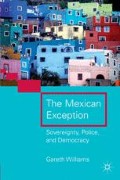Abstract
Recent scholarship on Alfonso Reyes and the antipositivist generation of scholars known as the “Ateneo de la Juventud” or, as Alfonso Garcia orales calls it, the “Ateneo de México,” has emphasized the universalizing function of the state and its relation to the humanist approach to cultural history in modern Mexico.1 Robert T. Conn has presented Alfonso Reyes’s intellectual sources through the prism of his “Aesthetic” and “Pedagogic” states as fundamental conceptual matrices for advancing the unifying function of culture. Meanwhile, drawing on Antonio Gramsci’s response to Hegel and Croce, Horacio Legrás has examined the relation between the formation of the “Ateneo” in the final years of the Díaz regime and the forging of what he calls the “ethical state” during the postrevolutionary period. Neither scholar, however, considers the historical, philosophical, and political question of sovereign power, or of sovereign will, in its relation to the universalizing function of the postrevolutionary state and the humanist rendering of national culture. As a result, a concept of the political in the relation between state function and humanistic culture in Alfonso Reyes, for example, is still largely unavailable to us. The purpose of this chapter is to explore that relation and its consequences for our understanding of police logic and its relation to history in twentieth-century Mexico.
The invisible is defined by the visible as its invisible, its forbidden vision: the invisible is not therefore simply what is outside the visible, the outer darkness of exclusion—but the inner darkness of exclusion, inside the visible itself because defined by its structure.
—Louis Althusser
To take sides is the worst thing we can do. It is far more legitimate to maintain hope in Vasconcelos’ “cosmic race”; or faith in Waldo Frank’s “human culture.” Let us adopt everything and strive to reconcile everything. That which cannot be reconciled will be wrong, and from there we can dispense with both left and right.
—Alfonso Reyes
The world is a labyrinth from which it is impossible to escape because all roads, even when they pretend to go North or South, really go to Rome.
—Jorge Luis Borges
Access this chapter
Tax calculation will be finalised at checkout
Purchases are for personal use only
Preview
Unable to display preview. Download preview PDF.
Copyright information
© 2011 Gareth Williams
About this chapter
Cite this chapter
Williams, G. (2011). Humanism Begets Good Order. In: The Mexican Exception. Palgrave Macmillan, New York. https://doi.org/10.1057/9780230119031_5
Download citation
DOI: https://doi.org/10.1057/9780230119031_5
Publisher Name: Palgrave Macmillan, New York
Print ISBN: 978-1-349-29263-9
Online ISBN: 978-0-230-11903-1
eBook Packages: Palgrave Political & Intern. Studies CollectionPolitical Science and International Studies (R0)

